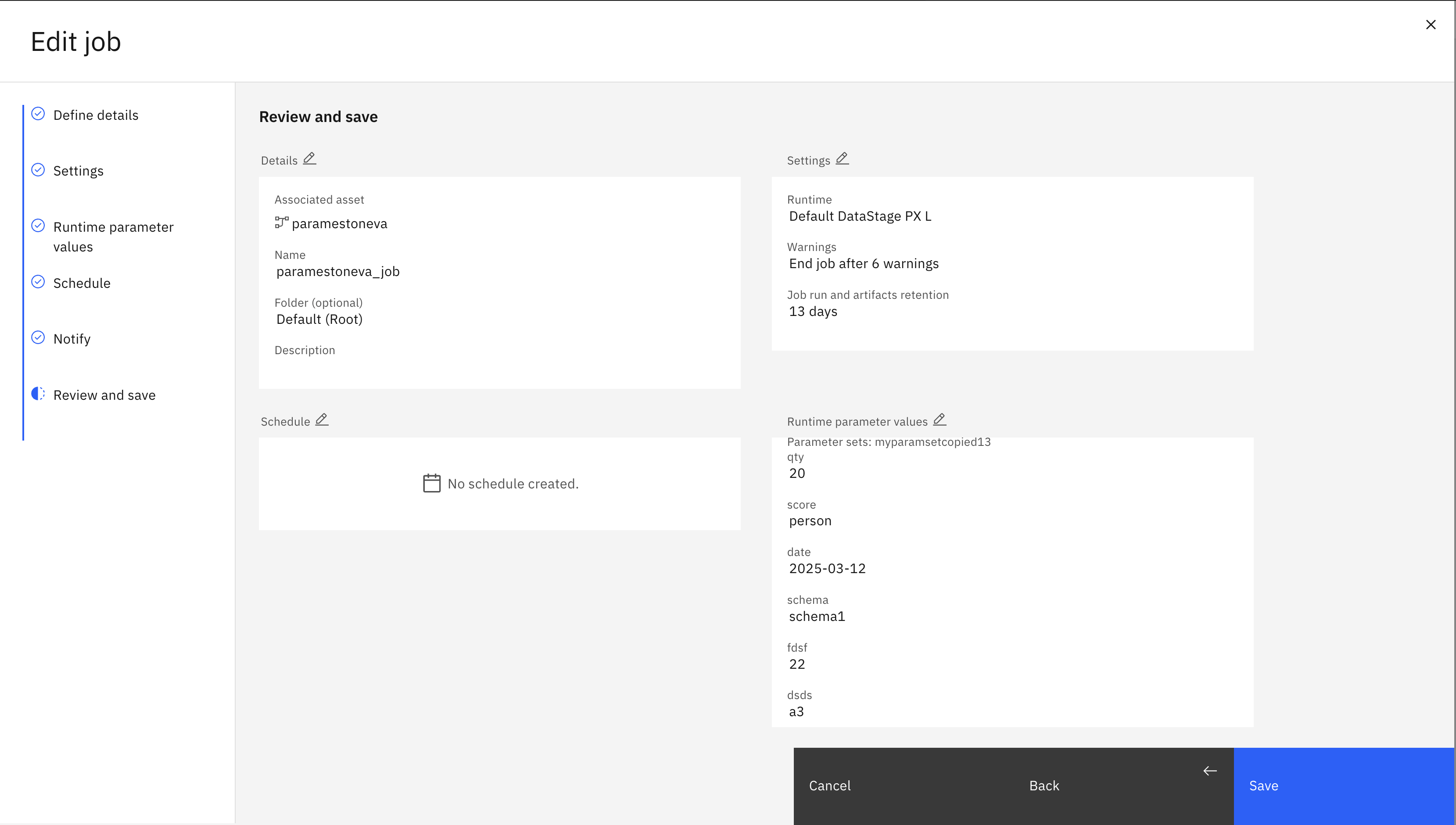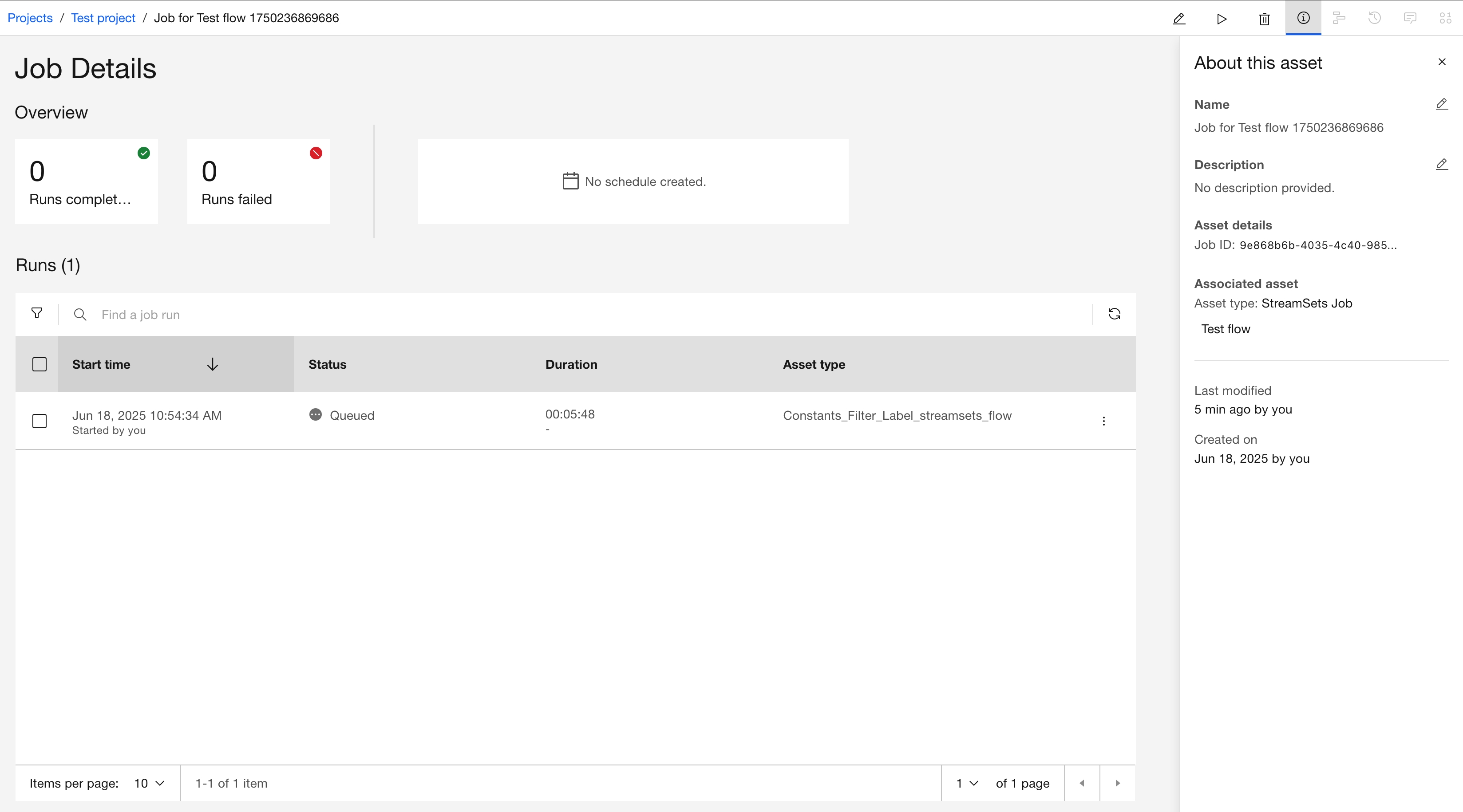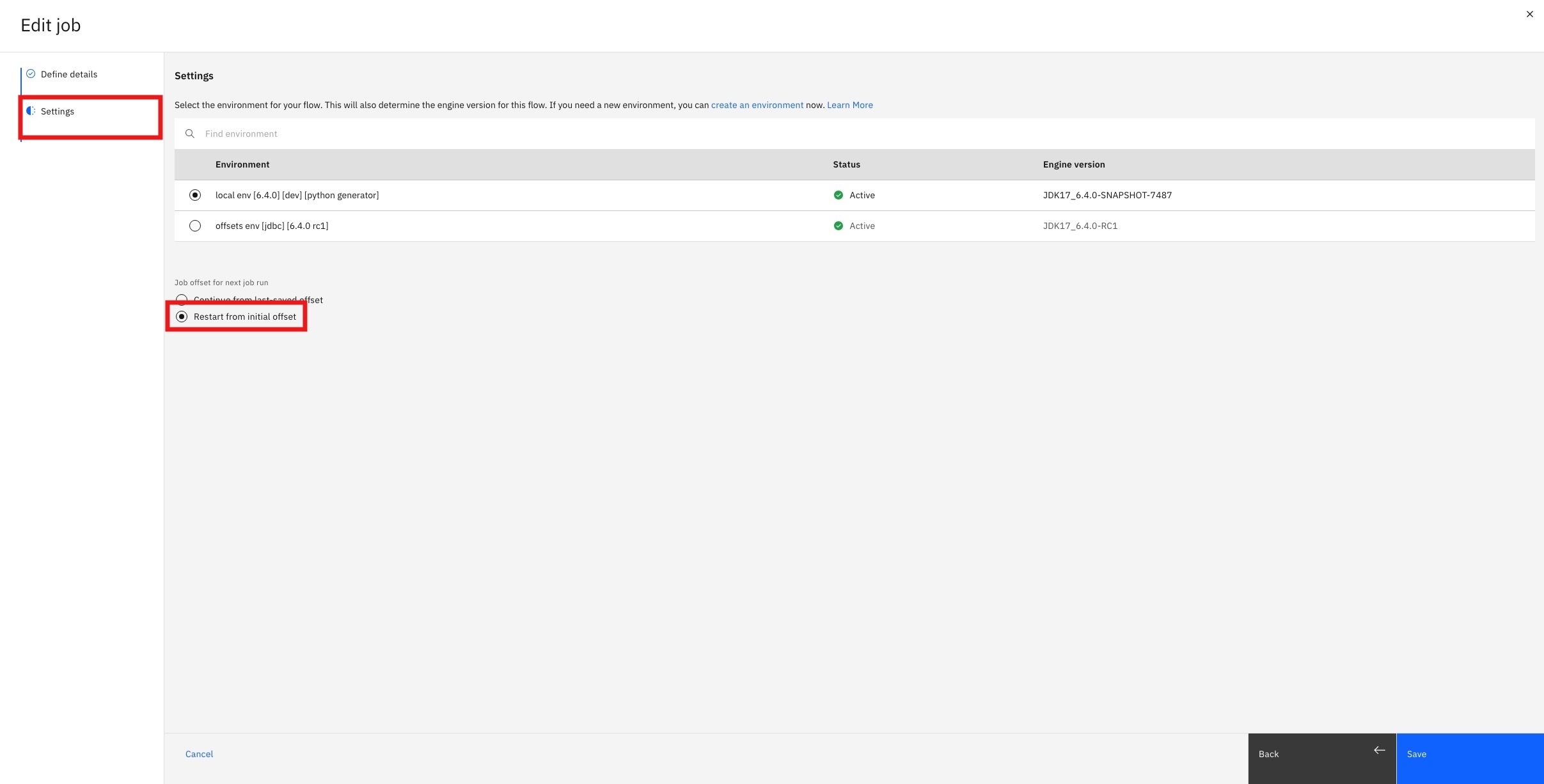Jobs#
A job is an executable unit of work defined for a specific asset. It acts as a reusable template that includes basic configuration and parameters.
The actual execution of a job is referred to as a job run. A job run allows you to override the default configuration and captures runtime execution details. The SDK provides functionality to interact with both jobs and job runs on the watsonx.data integration platform.
- This includes operations such as:
Creating a job
Retrieving an existing job
Updating a job
Editing runtime settings of a batch job
Starting a job
Retrieving a job run
Refreshing a job run state
Cancelling a job run
Retrieving logs from a job run
Deleting a job
Resetting an offset
Creating a Job#
In the UI, you can create and run a new Job directly from flow canvas by clicking the Run button.

To create a new Job object within a
Project using the SDK,
first select the appropriate project from the Platform,
then use the Project.create_job()
method to instantiate the job.
You must specify a reference to Flow object.
Additionally, you can provide optional configuration such as environment variables or job parameters.
This method returns a Job object.
>>> job = project.create_job(
... flow=flow,
... name='Test Job',
... description='...',
... )
>>> job
Job(name='Test Job', ...)
Retrieving an Existing Job#
To list existing jobs in the UI, navigate to the Jobs tab in project view.

Jobs can be retrieved using the Project.jobs property.
You can also further filter and refine the jobs returned based on attributes including
space_id, job_id, job_type and run_id.
This property returns a Jobs object.
>>> # Returns all jobs
>>> project.jobs
[Job(name='Test Job', ...)]
>>> # Returns first job matching given `name`
>>> project.jobs.get(name='Test Job')
Job(name='Test Job', ...)
>>> # Return a list of all jobs that match given `name`
>>> project.jobs.get_all(name='Test Job')
[Job(name='Test Job', ...)]
Updating a Job#
In the UI, you can update a job by selecting its title from the jobs list. To update a job, click the pencil icon in the top bar.

Updating a job is also possible via your Project instance.
First, modify the properties of the existing job, then update it using the
update_job() method.
This method returns an HTTP response indicating the status of the update operation.
The response also includes the updated job definition.
>>> job.metadata.name = 'New name'
>>> job.metadata.description = 'New description.'
>>> project.update_job(job)
<Response [200]>
Editing runtime settings (Batch)#
Batch flow jobs have runtime settings you can edit per job. In the UI, you can change runtime settings in the same location you update a job. Batch flows include additional settings.


In the SDK, you can call the edit_configuration() method on the job instance. Here are all the different settings you can change:
environment: The internal name of the batch environment to use. To find the internal name of a batch environment you can either list out all internal names withProject.list_batch_environments()or callProject.get_batch_environment()with the display name.
>>> project.list_batch_environments()
['default_datastage_px', 'default_datastage_px_large', 'default_datastage_px_medium']
>>> project.get_batch_environment('Default DataStage PX S')
'default_datastage_px'
warn_limit: The number of warnings before the stages are stopped. Takes anintgreater than 0 or None for no limit.retention_days: The number of days to keep a job run. Cannot be set ifretention_amountis also set. Takes anintgreater than 0 or None for no limit.retention_amount: The number of job runs to keep in total. Cannot be set ifretention_daysis also set. Takes anintgreater than 0 or None for no limit.parameter_value_sets: The value sets to use in this job. Takes alistoftupleswhere the first value is the name of the parameter set and the second value is the value set to use for that parameter set.job_parameters: The values you want to use for the external and local parameters in this job. Takes alistoftupleswhere the first value is the name of the parameter and the second value is the value to use for that parameter. For external parameters make sure the name of the parameter set is in front of the name of the parameter:parameter_set.parameter.schedule: The schedule you wish to run the job on. Takes aScheduleobject or None for no schedule.notify_success: Takes abooleanindicating whether to notify on success.notify_warning: Takes abooleanindicating whether to notify on warning.notify_failure: Takes abooleanindicating whether to notify on failure.
>>> import datetime
>>> from ibm_watsonx_data_integration.cpd_models.job_model import Schedule
>>> schedule = Schedule(start_date = datetime.datetime(2030, 12, 11, 22, 17), repeat_mode = 'daily', repeat_value = datetime.time(23, 17))
>>> batch_job.edit_configuration(
... environment='default_datastage_px',
... retention_amount=100,
... parameter_value_sets=[('myparamset', 'value_set_1'), ('paramset2', 'valset_2')],
... job_parameters=[('myparamset.param1', 'myvalue'), ('localparam1', 'myvalue2')],
... schedule=schedule,
... notify_success=True,
... notify_warning=False,
... notify_failure=True
... )
<Response [200]>
Starting a Job#
In the UI, you can start a job from the Job Details page by clicking the play icon.

A job instance serves as a template to actually execute the flow for which the job was created.
Call the Job.start() method on the job instance.
You must pass a name and a description to define the job run.
Additionally, you can further configure the job run by passing the configuration,
job_parameters and parameter_sets fields to this method.
This method returns a JobRun object.
>>> job_run = job.start(name='Test Job Run', description='...')
>>> job_run
JobRun(...job_name='New name'...)
Retrieving a Job Run#
To view job runs in the UI, go to the Jobs tab, select a job, and open the Job Details page.

Job runs can be retrieved using the job_runs property.
You can filter the returned jobs by space_id and state attributes.
This property returns a JobRuns object.
>>> # Returns a list of all job runs for given job
>>> job.job_runs
[JobRun(...job_name='New name'...)]
>>> # Returns a list of all job runs which job_type is `streamsets_flow`
>>> from ibm_watsonx_data_integration.cpd_models.job_model import JobRunState
>>> job.job_runs.get_all(job_type='streamsets_flow')
[JobRun(...job_name='New name'...)]
Refreshing a Job Run state#
In the UI, you can refresh a job status by clicking the 3 dots next to a job and then ‘Refresh status’.

To refresh a job run using the SDK you need to call the JobRun.refresh_status() method.
It updates the JobRun.state property.
>>> job_run.refresh_status()
<Response [200]>
>>> job_run.state
<JobRunState...>
Cancelling a Job Run#
In the UI, you can cancel a job run by selecting Cancel from the three-dot menu of the selected run.

To cancel a running job run using the SDK, use the JobRun.cancel()
method on the job run instance.
This method returns an HTTP response indicating the status of the operation.
>>> job_run.cancel()
<Response [204]>
Retrieving a Job Run logs#
Runtime logs for a job run execution are stored in the
JobRun.logs property.
It returns a list where each entry is a string containing a log message.
>>> job_run.logs
[
'##I IIS-DSEE-TOSH-00397 2025-05-27 14:27:27(000) Starting job Job for Test flow 1750236869686',
'##I IIS-DSEE-TOSH-00408 2025-05-27 14:27:27(000) Job Parameters:',
...
]
Deleting a Job#
In the UI, you can delete a job by selecting its title from the jobs list. To delete a job, click the trash icon in the top bar.

To delete a job, you can pass the job instance to the Project.delete_job() method.
This method returns an HTTP response indicating the status of the delete operation.
>>> project.delete_job(job)
<Response [204]>
Resetting an Offset (Streaming)#
Warning
This method doesn’t work on batch jobs.
Jobs use offsets to track the last processed data before they were completed or canceled. In certain cases, it may be necessary to reset a job’s offset to reprocess data. To reset the job offset in the UI select Restart from initial offset from edit job screen.

Job offsets can be reset using the Job.reset_offset()
method on the job instance.
>>> job.reset_offset()
<Response [200]>